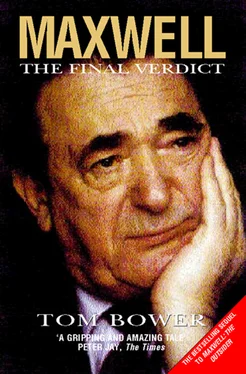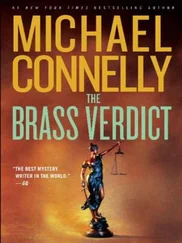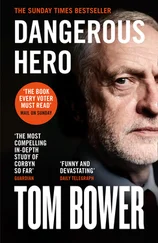Imposing not so much a Chinese wall as a concrete one around himself, Cowling had not discussed his task with his Coopers colleagues working on other Maxwell companies’ accounts. Nevertheless, within days he noticed that pension fund money had ‘disappeared’ because the systems, controls and records of BIM and LBI were chaotic. He also discovered that important details about the stock lending were ‘unknown’.
When Maxwell returned to London in the early hours of 7 December, he could only hope that Cowling could be placated if he unearthed any discrepancies. His major concern was that Cowling would ask to see the actual share certificates rather than photocopies. Since many of them were held by the banks, that would pose a tricky problem. Maxwell’s first conversations with Kevin seemed encouraging. To comply with the law governing the formal submission of annual accounts, Cowling had agreed to sign BIM’s accounts immediately, although his work could only be completed over the following weeks.
Relieved by that outcome, in the run-up to the Christmas holidays Maxwell closeted himself with lawyers. Despite the millions spent in legal fees over the years, he had won few victories in the courts, yet his threats of litigation often served his purpose, silencing enemies and deterring creditors. Not surprisingly, his massive expenditure on lawyers galvanized most of the profession to offer him their services unconditionally. But, contrary to his practice with accountants and bankers, he made no effort to retain the services of the large, prestigious partnerships mushrooming around the City. Instead he sought individuals who could be relied upon to devote themselves – personally and professionally – more than wholeheartedly to his cause.
In-house he relied upon Oscar Beuselinck to manage his writs for defamation against the growing number of critics. Although the seventy-one-year-old solicitor had represented Private Eye against Maxwell in 1986, he had agreed to work for the Publisher at a salary twice as large as he had expected.
The second in-house lawyer was Debbie Maxwell. Preoccupied by the need to defend several writs against Maxwell for payment of millions of pounds in unpaid fees and damages for broken contracts, she had become renowned for asking her employer, ‘How shall I describe this: half full or half empty?’ At 10 a.m. on Sunday, 9 December, she was sat discussing a more serious problem with him. Increasingly her name was being used as MCC’s compliance officer, and in three memoranda she had warned the Chairman that his secret purchase of MCC shares broke company law, infringed stock exchange regulations and damaged the interests of the pension funds. Unable to persuade him to cease these transgressions, Debbie Maxwell resigned her compliance duties and was subsequently criticized for not revealing her knowledge to the statutory authorities – the police, IMRO, the Department of Trade and Industry or the stock exchange.
Over lunch that day, Maxwell consulted David Maislish, a thirty-nine-year-old solicitor managing his own small firm. Its slender resources made it eminently suitable for his purposes, for regardless of any other professional or domestic obligations, Maislish was always ready to jump to his bidding. His direct competitors were Dick Russell and David Vogel of Titmuss Sainer and Webb, a medium-sized firm of solicitors linked to Charles Clore, the property developer. An even closer connection was that Vogel had become godfather to one of Kevin’s daughters, and Russell was married to Mandy, Pandora’s sister. Summoned to Maxwell’s office to give advice, the brother-in-law and godfather would rush round from their nearby offices knowing full well that the Publisher had already decided his course of action but wanted assurance that his chosen ploy would escape prosecution. Listening to the most litigious man in the kingdom enjoying the sound of his own voice, the trio of lawyers would console themselves with the reflection that they billed by the hour – and that their income was phenomenal.
In the very nature of Maxwell’s way of business, it was essential to prove that his course of action had been taken only after consultation with and approval by a lawyer. The law, he believed, was nothing less than a weapon – the more lethal the better. The ‘comfort’ letters provided by Maislish and Vogel were Maxwell’s first line of defence against any criticism, and they usually sufficed. In London, lawyers were still blessed with the aura of professionals, apparently bound by a Hippocratic oath to serve the interests of justice rather than Mammon. Throughout the capital, Maislish, on Maxwell’s behalf, had won an unenviable reputation for pulling every legitimate trick in the book to delay and defeat unwelcome writs.
Maislish knew that, should he fail his paymaster, others would be eager replacements – not least Philip Morgenstern, a senior partner at Nicholson Graham and Jones and a confidant of both Kevin and Robert. Unlike Maislish, Morgenstern was something of a sleuth, always hovering quietly in his master’s footsteps, undertaking the more private work, arousing suspicion even eulogizing the Chairman’s qualities in 1995. Like Maislish, although he evinced only circumspect emotional commitment to Maxwell, Morgenstern’s dedication seemed passionate. Maxwell’s was an account which none of those lawyers wanted to lose.
But all the lawyers recognized that Maxwell’s memory and energy were waning. As his affairs grew more complicated, the interlocking and overlapping corporations he had constructed to confuse outsiders were proving difficult even for him to untangle. It was a condition which his vanity would deny as he restlessly drove himself to protect his achievements and sustain his ambitions.
By Tuesday, 11 December, Maxwell’s formidable spirit had risen to the level required if he was to match an exhausting climax of constant meetings. Employees and representatives were flying into London from Moscow, Berlin, Frankfurt, Sofia, Tel Aviv, New York and Hong Kong to bring news of deals, ventures and problems. While the underlings were transported from Heathrow by helicopter to be housed in hotels at his expense, Maxwell was seated in his office, planning new banks in Russia and Bulgaria, media purchases in Israel and Germany, and the development of market research in the Far East. His adrenalin was racing as he burst into the dining room that lunchtime to confront his newspaper editors and senior executives.
As Joseph Pereira, his quiet Portuguese valet, served another unmemorable dish, Maxwell’s dissatisfaction with the Daily Mirror engulfed the room. His target was Roy Greenslade, the newspaper’s editor. Greenslade’s sin was to have refrained from printing Maxwell’s offer of a scoop – that six ministers would resign in protest against Margaret Thatcher’s refusal to stand down after her failure to pass the threshold vote in the Conservative leadership election on 20 November. ‘Just print it!’ Maxwell had shouted. ‘I am your publisher!’ But since there had been no corroboration (the prime minister had resigned two days later), Greenslade had refused, and in Maxwell’s opinion had shown himself to be untrustworthy. During that lunch, the insubordinate editor seemed unrepentant, and Maxwell appealed for support to Charles ‘Gorbals’ Wilson, the former editor of The Times . Wilson, a small, pugnacious Scot, had gratefully accepted the Captain’s shilling to become the editor of the Mirror Group’s Sporting Life after his removal by Rupert Murdoch. It was a road to somewhere for a man who was going nowhere. Naturally, experience had long taught Wilson to satisfy his employer’s whims, even with tongue in cheek: ‘I would have said it sounds like a flier to me, Bob.’
‘What?’ exclaimed Maxwell. ‘A flier. It was a scoop. The scoop of the decade.’
Читать дальше












